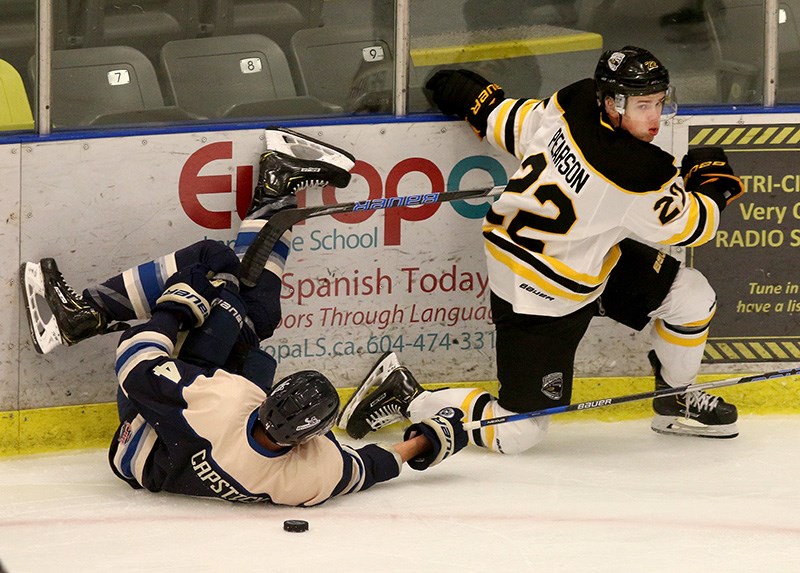A junior hockey player lying unconscious on the ice at the Poirier Sport and Leisure Complex should be a wakeup call to the way emergency responders are dispatched to medical calls, says a Coquitlam councillor.
Coun. Dennis Marsden, who also serves as the public address announcer for Coquitlam Express home games, was among more than 800 worrying fans, officials and teammates at the arena Sunday awaiting the arrival of trained emergency services when Express forward Danny Pearson crashed hard into the boards during a BC Hockey League game against the Powell River Kings. Pearson was knocked out and immediately attended to by trainers from both teams, as well as volunteers with first aid training, said Express president Mark Pettie.
But it took more than 30 minutes for a crew from Coquitlam Fire and Rescue to attend, followed by paramedics from BC Ambulance.
That’s not acceptable, Marsden said, blaming a new protocol recently implemented by B.C. Emergency Health Services (BCEHS) that determines how ambulances and fire departments are dispatched to non-life threatening situations.
The Clinical Response Model for dispatching ambulances and paramedics was implemented last May to prioritize the most life-threatening calls.
Coquitlam deputy fire chief Rod Gill said a determination about the severity of a medical situation is made by BCEHS dispatchers based upon a series of questions asked of the person calling in the emergency.
He said Sunday’s call to the arena was likely designated at an “orange” level, with a serious but not immediately life-threatening injury that could be attended by only an ambulance crew within 10 minutes.
But that crew can be called away to a higher priority emergency, resetting the clock, Gill said.
“This could happen two or three times potentially,” he said, adding Coquitlam fire wasn’t alerted to the call at Poirier until a second call from the arena specifically requested the fire department to attend, which they did within four to six minutes.
“It’s frustrating that we’re not assigned those calls when we know we can help,” Gill said.
Shannon Miller, a spokesperson for BCEHS, said there were calls to two separate incidents at the sports complex within 10 minutes of each other, and the crew sent to the Express game arrived in 22 minutes. She said the call for Pearson's injury was coded as yellow and in both cases the patient was reported to be conscious and alert so they didn’t require a heightened level of response.
“We notify the fire department for a lot of urgent, more acute calls,” she said. “That’s just triaging.”
Shannon added even under the previous dispatch protocol the fire department wouldn't have been notified.
"BCEHS does not notify firefighters of every call - if they are responding to a patient with a non-urgent condition, they could be tied up when we need them to respond to a life-threatening call as a first responder," she said.
Marsden said while Pearson was in the good hands of qualified athletic trainers and volunteers, that might not be the case at a minor hockey game, community soccer match or swim meet.
“We need to ensure whoever is in need of medical assistance can get it,” Marsden said, adding the issue has been on the radar of several municipalities across the province and was discussed at last September’s Union of B.C. Municipalities convention for further action at the policy level.
In July, Port Moody’s city council sent a letter to the president of BCEHS, Carl Roy, urging the agency’s first responder medical program make full use of first responders like fire departments.
Gill said while the dispatch policy considers the outcome of injuries, “the model doesn’t take into consideration the pain and anguish.”
Marsden said that has to change or “it’s only a matter of time where we see a situation where somebody passes away.”
In the meantime, he said, he’ll be connecting with the city’s parks department to ensure proper medical equipment is in place at all the city’s recreational facilities, as well as assess the training of staff at those facilities.
Pettie said Pearson sustained a concussion and he was released from the hospital Sunday evening.
Dec. 18 — Story corrected to include timeline according to BCEHS dispatch logs, as well as to clarify how ambulance calls are dispatched.



